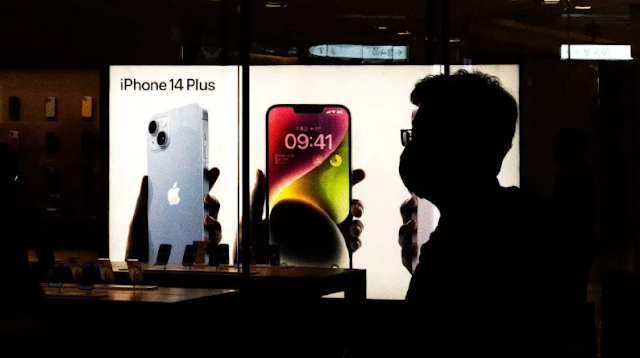Last week, Apple announced plans to make its latest model of its phone–the iPhone 14–in India, an important achievement in the company's strategy to diversify manufacturing outside of China.
Five percent of iPhone 14 production is expected to move into the country this year, much sooner than analysts expected.
By 2025, a quarter of all iPhones the company makes could be produced in India, analysts at investment bank JP Morgan say.
Apple has been producing iPhones in the southern Indian province of Tamil Nadu starting around 2017.
But the decision to make their flagship model in India a noteworthy move as trade tensions between Beijing and Washington show no signs of abating.
The move is also gaining prominence against the backdrop of the global supply chain "risk removal" being carried out because of China's "zero Covid" policy.
"China plus one"
Beijing's hardline approach to eradicating the pandemic has led to industrial lockdown and widespread supply chain disruption.
As a result, global companies are increasingly adopting a "plus one" strategy — or avoiding investing in China alone — to reorient their supply chains.
Oscar De Cock, chief supply chain business chief for logistics company DHL, told the BBC: "Companies are no longer ready to sit back and wait for a change in policy in China, or to put their eggs in one basket to meet their sourcing needs.
"They need to ensure they have a few other options," Mr. DeBock said, adding that this trend toward "multi-source supply" has had clear beneficiaries in countries like India, Vietnam and Mexico.
De Bock was in Mumbai, India's financial capital, to announce a €500 million ($49 million; £43 million) investment to double DHL's storage capacity and staff in the next five years.
That commitment has been driven in part by the growth of foreign investment in sectors such as manufacturing and electronics as Prime Minister Narendra Modi's government offers financial incentives to companies keen to make India the centre of their production, he said.
As part of the production-related incentive scheme (PLI), mining group Vedanta Resources has also allocated investments approaching $20 billion (£17 billion) to set up a semiconductor plant in India in collaboration with Taiwanese electronics manufacturing giant Foxconn.
Anil Agarwal, president of Vedanta Resources, said last month that the world is looking forward to adopting a "China plus one" strategy and that "India is clearly in a good position."
Turning point
But despite these ancient challenges, India is in a better position than ever to take advantage of this "historic opportunity," says Alex Capri, a research fellow at the Henrich Foundation.
He says some of India's "key concentrated nodes" — southern states such as Tamil Nadu, Telangana, and the National Capital Region in the north — are well positioned to develop a critical mass in manufacturing, as the United States and its allies break away from China.






.jpg)




.jpeg)
.jpeg)
.webp)
0 Post a Comment:
Post a Comment